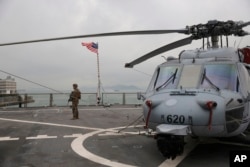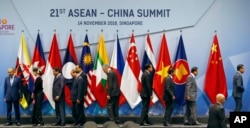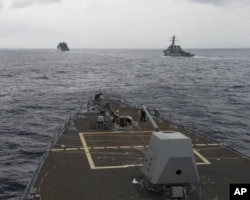China and Southeast Asian countries that dispute sovereignty over a strategic Asian sea aim to speed up talks toward a code of conduct that would lower the risk of accidents and help keep the U.S. government out of the fray.
Chinese Foreign Minister Wang Yi said his country and a bloc of Southeast Asian states will "speed up" talks on a code of conduct in the South China Sea, Beijing's state-run China Daily reported March 8. Wang told reporters days later the talks were "gathering pace under a clear road map.”
That goal should mean a 2020 signing date -- ahead of an earlier Chinese forecast of 2021 -- for the agreement aimed at guiding ships away from mishaps in the vast, crowded South China Sea, some analysts believe.
China resents the U.S. Navy for passing ships through the sea, where Beijing has a military and technological advantage over the four Southeast Asian countries that also claim parts of it. An early signing of the code would show Washington that Beijing can work with its neighbors without U.S. influence, scholars say.
“If there’s no United States, the Chinese won’t say that the code of conduct is a must-have document,” said Yun Sun, East Asia Program senior associate with the Stimson Center think tank in Washington, D.C.
“With a code of conduct, the Chinese could tell the Americans that ‘we already have a deal, and there’s no reason for you to get involved and whatever we do is between me, China, and them, Southeast Asian countries,’” she said.
Brunei, China, Malaysia, the Philippines, Taiwan and Vietnam claim all or parts of the 3.5 million-square-kilometer sea that’s prized for fisheries, shipping lanes and fossil fuel reserves. China has alarmed the others since 2010 by building artificial islands for military installations.
Washington, which counts some of the other states as allies, stepped up naval patrols of the sea in 2017 to monitor Chinese activity there.
Laggard increases speed
China and the 10-country Association of Southeast Asian Nations (ASEAN) have talked off and on about a code of conduct for the sea since ASEAN endorsed the idea in 1996. Some analysts believe China had once stalled the process but came around in 2016 after losing a world court arbitration over the legal basis for its claim to about 90 percent of the sea.
As tough Sino-ASEAN discussions began after a 2017 commitment to reach a deal, Chinese Premier Li Keqiang anticipated last year the code would take three years to finish.
Next year is likely for a deal on the code of conduct because China hopes to work with Vietnam, the 2020 chair of ASEAN, said Termsak Chalermpalanupap, fellow with the ISEAS Yusof Ishak Institute in Singapore. China and ASEAN are focusing this year on trade liberalization, he said.
“I think the Chinese side seems to indicate they now want to make it quicker," he said. "I think it may be next year. Next year will be the turn of Vietnam chairing ASEAN. I think China may have strategic reasons to work with Vietnam.”
Vietnam is the most outspoken Southeast Asian country with claims to the sea. Although accidents are rare in the sea today, Vietnamese and Chinese vessels rammed one another over a Chinese oil rig in 2014. They also engaged in deadly clashes in 1974 and 1988.
The code of conduct is due to set out guidelines for stopping such incidents in the sea that supports one-third of the world’s marine shipping traffic and a fishing industry that employs an estimated 3.7 million people.
Foiling US naval movements
Under President Donald Trump, the U.S. Navy has passed ships through the South China Sea at least 10 times. China resents those movements, because the militarily stronger U.S. government -- an old Cold War foe -- makes no claim to the sea.
Progress toward the code of conduct will improve spirits at future Sino-ASEAN joint military exercises, said Alexander Huang, strategic studies professor at Tamkang University in Taiwan.
Next month, the Pentagon will unveil a new Indo Pacific military strategy before defense chiefs around the Asia Pacific at the Shangri-La Dialogue later this month, according to the USNI News website. The strategy is seen as a way to monitor Chinese maritime expansion.
“Probably China wanted to have some input before the U.S. pronouncement,” Huang said.
U.S. officials have historic alliances with Taiwan the Philippines plus a budding relationship with its old war foe Vietnam. Those countries, all militarily weaker than China, look to Washington to cap Chinese influence.
Tough talks
Acceleration of talks toward a code of conduct won’t be easy, analysts have warned. They expect that sovereignty-conscious Beijing will oppose defining the scope of the sea, resist any binding agreement and block provisions for enforcement that would limit Chinese maritime activities. ASEAN is expected to ask for those details during talks.
ASEAN finds some of the Chinese demands are “impossible,” Sun said.
China has advocated before a speedier deal to show goodwill in Southeast Asia, yet without results, cautioned Oh Ei Sun, senior fellow with the Singapore Institute of International Affairs. “From time to time they will put out statements like that,” he said. “The negotiations simply did not conclude.”







